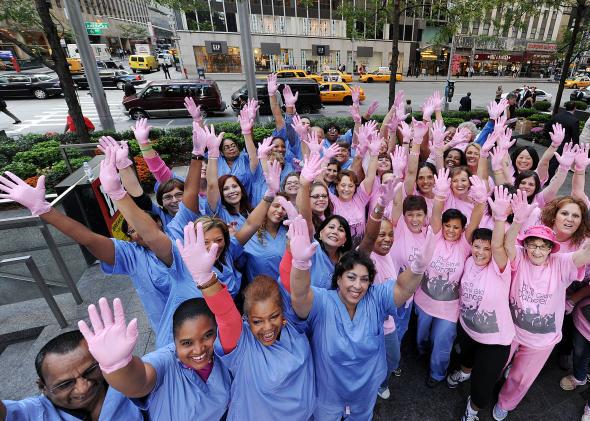Gawker published a wrenching story this weekend by Lauren Sczudlo about life in the aftermath of her cancer treatment. Sczudlo lived, but she failed to live up to our cheerily hopeful vision of the cancer survivor. After undergoing chemo, radiation, and a stem-cell transplant, she fell into depression. And sadly, she writes, most of her family was too disappointed in her lack of positivity to support her as she tried to pick up the pieces.
“I think they expected me to exude the upbeat attitude of the survivors on television commercials, donning pink ribbons and walking marathons, declaring a new lease on life,” Sczudlo writes. “Cancer patients are expected to be poster children of a movement, meant to reassure the masses that this plague, and even imminent death, can be overcome with positive affirmations and attitude adjustments.” The nastier flipside of this faith in optimism is the belief that patients who don’t radiate hope are somehow impeding their own recovery. Sczudlo observes that “we feel more in control of our lives if we believe sick people got that way by making bad choices.” But this erroneous idea denies each patient “the freedom to mourn the loss of her old self—because cancer almost always kills a more fearless version of ourselves.”
You should read the entirety of Sczuldlo’s beautiful and illuminating essay. Then you should read The Fault in Our Stars, by John Green, which explores these issues sensitively and at length—and will also make you cry/give you chills/change your life. Then you should come back and stew with me in the woeful unfairness of burdening cancer survivors with our desire for heroic narratives.
It is lovely if people who go through an ordeal like cancer treatment—which, Sczudlo says, “filled my mouth, labia, and anus with sores that bled and left me barren”—somehow manage to be grateful for surviving it rather than bitter, furious, or depressed about what happened to them. But the logical response to those experiences is not joy or saintly acceptance. It is, as Sczudlo explains, “a silent-but-deadly depression cloud following me … so deep that I could barely bring myself to engage in small talk or string words into coherent sentences.”
Almost 25 percent of cancer patients develop depression. Many encounter the black dog after their treatment has ended. “I’m grieving for the person I was before I learned I had cancer. Mortality is no longer abstract, and a certain innocence has been lost,” wrote Dana Jennings, who recovered from prostate cancer, in 2009. “Even though my health keeps improving, and there’s a good chance that I’m cancer free, I still feel stalked, as if the cancer were perched on my shoulder like some unrepentant imp.”
Why do we as a culture expect positivity from those on the other side of cancer treatment? Why do we demand an upbeat attitude from people who have seen the extremes of hardship or perpetuate this idea that there is a “right” way to suffer from a disease? There is no “right” way. And blaming something like cancer on someone’s state of mind strikes me as the same kind of new age hooey—pseudoscience underpinned by a desperate wish for control—that produces lunatic fads like juice cleansing (which is, by the way, sometimes marketed to cancer patients). Pressuring survivors to embody our fond hopes for human fortitude is exploiting people at their most vulnerable.
That said, I can understand why, in our search for heroes, we zero in on those who have experienced adversity. And the discourse surrounding cancer—one “battles” it, one “overcomes” or “succumbs”—lends itself to such valorizing. But let’s agree that cancer survivors are the last people we should expect to inspire us with their brave and uplifting outlook on life. They’ve been through enough.
